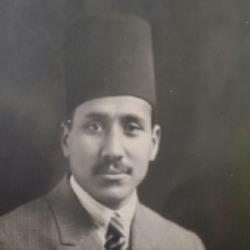Muhammad Farid Abu Hadid (1893-1968) known to be the first arab story writer, is a pioneer and one of the best writers the Arab world has ever known. Born in Damanhour, to the north of the Nile Delta, on July 1, 1893. He was brought up in a countryside setting, where his mother was a close relative of Sheikh Selim Al Bishri, once the Grand Sheikh of Al Azhar. In this environment, where deep religious faith, appreciation of literature, sense of humour and quick wit were happily blended, Abu Hadid first came in contact with the world of literature.
He married Mrs. Nefeesah Hanim and fathered eight children. His wife was born on July 18, 1916. When Mohamed became very sick in 1965, he approached his wife and told her
" I feel my life will come to an end and take care of yourself".
He lived a very simple life and never placed any curtains on his windows. He hated injustice and was very sympathetic to the poor.
His wife loved him very much . In an interview with Nisf El Dinia she stated that he used to write in his living room while she used to sit in front of him reading or sewing.
Muhammad Farid Abu Hadid was a leading literary writer, novelist and educationalist. He was a leading pioneer in the various new forms of literary writing that was emerging at his time.He lived in a critical period in the history of Arabic literature in Egypt.
That was a period of transition from the immature and oscillating beginnings of the 19th century, to the increasingly crystallized literary forms and styles of the 20th century.
His Career
In 1914, Abu Hadid graduated in the teachers’ College. He was later involved in teaching positions in various parts of Egypt.
In 1937, he worked as a Censor for the press and Undersecretary of the National Library.
In 1945, he became the Dean of the Institute of Education.
In 1946, he was appointed among 12 members in FouadI's Academy of Arabic Language
In 1947, he was appointed Director of the Department o f Culture.
In 1950, he became Director of the Popular University.
In 1951, he was assigned a Director of the Department for the eradication of illiteracy.
In 1953, he reached the age of retirement, but the Ministry retained him as General Technical Advisor.
Abu- Hadid was a member of:
Committee of vocabulary and styles.
Committee of literature.
Committee of Philosophical, Social, Sciences, History and Geography.
He participated in establishing the Egyptian Association for Social Studies 1937.
He participated in the Conference on Primary Education in Bom bay, India, 1953.
He was one of the founders of the Novel Club.
He was a rapporteur of the Folkloric Arts Committee at the Supreme Council Arts, Literature and Social Sciences.
Farid Abu Hadid was awarded:
The Order of Merit, Second Class
The Order of the Republic, Second class
The State Merit Award in literature 1963/ 1964
Throughout his rich career extending for about forty-six years (1918-1965), he was a prolific writer of a high calibre.
The only story that was presented to the movie was " Abu El Fawaris Antar Ibn Shaddad". The television presented "Zahrat El Soor El A'Aly".
Muhammad Farid Abu Hadid died in May, 18, 1967 at almost the age of 74
A selection of his works are :
Narrative works
Pages from a Life Story
The Mameluke's Daughter
Blank Verse
Assassination of Caliph Osman
Maysour, the Gypsy
Khisro and Sherien
Short Stories : The Miracle
Historical Novels
The Stray King
Xenobia, Queen of Tadmor
The Great Knight, Antara Sarcastic
Critical and Social Novels
Goha's Pain
Thorn Roses
I the People
Stories for Children
Amroon Shaha
Karim Eddin Al- Bagdadi



